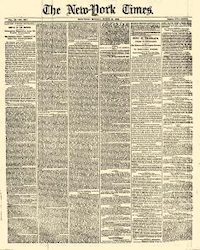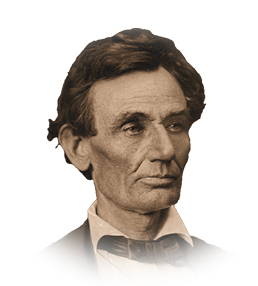
Rain Again—Prospects of the Crop Improved—Political Affairs. The New York Times, June 19, 1860 Lawrence, Sunday, June 10, 1860. Yesterday morning, to the great joy of Kansas, we awoke to find the earth refreshed by a warm and gentle rain, that continued an hour or two, until about an inch in depth had fallen. It [...]

We presume the Democrats will enter the canvass with two candidates. The New York Times, June 18, 1860. The Democrats renew their attempt to nominate a Presidential candidate to-day, at Baltimore. Everything at present indicates a stormy session. The Douglas men are apparently desperate, and inclined to resort to desperate measures for the accomplishment of [...]

Harpers Weekly, June 16, 1860 The Democratic nomination will be made at Baltimore on the 18th instant, and the Presidential campaign of 1860 will then be fairly opened. Two of the parties have already engaged in the contest, and the third will not be far behind. It is our province to survey the field with [...]

Pro-Slavery censorship of the news via the Post-office. The New York Times, June 16, 1860 The citizens of the Border States are at last beginning to raise their voices against the wholesale robbery, of which the United States Post-office is now being made the instrument by the Pro-Slavery zealots of the South, with the active [...]

Danger of an Utter Failure of Crops—Prospect of Famine—Dismal Forbodings. The New York Times, June 16, 1860 Lawrence, Kansas, Wednesday, June 6, 1860. The one topic, more absorbing to us than all others, is the distressing drouth that prevails in Kansas, and probably in some of the States. When I wrote you some two weeks [...]

The New York Times, June 16, 1860 BALTIMORE, Friday, June 15. Trains Three trains, crowded, from the west arrived to-day. Three more on the Baltimore and Ohio Road are expected on the way, with a thousand delegates, &c., to the Convention, from Illinois. Indiana, Ohio, Cincinnati—the delegations with a band of music. Intelligence from western [...]

The New York Times, June 15, 1860 The Massachusetts Legislature has resorted to the rather unusual proceeding of indorsing Senator SUMNER’S recent Anti-Slavery speech. Whether that body is in the habit of sitting in judgment upon each speech of its Federal Senators, or whether circumstances existed which rendered its indorsement in this specific case particularly [...]

The New York Times, June 15, 1860 Special Dispatch to the New-York Times. Washington, Thursday, June 14, 1860 The city is again filled with Delegates, discussing the chances of candidates in Baltimore. The friends of DOUGLAS are still sanguine, while the ultras swear terribly, and threaten to break up the Convention, if DOUGLAS does not [...]

The New York Times, June 13, 1860 The Democratic Convention at Richmond has adjourned, to await the action of their Northern brethren at Baltimore. They have done exactly nothing else. They took no action concerning a platform, said nothing about candidates, rigorously suppressed all freedom of debate, and severely snubbed the irrepressible Col. BALDWIN, of [...]

The New York Times, June 12, 1860 Lincoln and Hamlin Enthusiasm St. Louis, Wednesday, June 6, 1860. Republicanism is no sham in Missouri. Whatever may be its guise in other Slave States, here it stands out boldly and defiantly, in its true colors. The party which dominates our city, and which in the last four [...]

Second Day’s Proceedings—All Seceding States Represented but Delaware—New York Represented by Twelve Delegates. The New York Times, June 12, 1860 RICHMOND, Monday, June 11 The Convention assembled at noon. Gov. LURBUCK, of Texas, was called to the Chair, and returned thanks. He deemed his selection a compliment to his State. He trusted they had assembled [...]

The New York Times, June 11, 1860 The Democratic cauldron is beginning to boil again. The time for another attempt at nominating a Presidential candidate is close at hand. The Southern veins of the party meets this week at Richmond,—the Northern wing next week at Baltimore. The Richmond convocation will be merely preliminary. It will [...]

The New York Times, June 11, 1860 Washington, Saturday, June 9. Mr. Sumner Threatened with an Assault. Many rumors, some of an extraordinary character, prevail as to Mr. SUMNER. It appears that early last night, an individual representing himself from Virginia called at his room, and imperiously demanded an explanation of certain parts of his [...]

The New York Times, June 11, 1860 New Orleans, Saturday, June 9. The Douglas Convention at Donaldsonville has adjourned. It was represented by one hundred delegates from twenty-one parishes. Resolutions were adopted condemning the Charleston seceders, and expressing a determination to abide by the Baltimore nominations. The delegates appointed to attend the Baltimore Convention go [...]

Seventeen Hundred African Slaves at Key West. The New York Times, June 4, 1860 The United States steamer Crusader, Lieut. Commandant John N. Maffit, came into Havana on the 29th from Key West. The Crusader, on the afternoon of the 23d ult., off Cay Verde, in the mouth of the old Bahama channel, captured a [...]

Note: In this letter to The New York Times by Robert Barnwell Rhett, he never mentions slavery. However, when he writes about “the rights of the South in a Territory,” he is talking about the “right” to extend slavery into the territories. (MpG 6/1/2020) . The New York Times, June 2, 1860 Charleston, May 10, [...]

On receiving the news of the attack by Indians on the Pony Express riders, a large number of Senators and Representatives addressed a note to the Secretary of War, asking the intervention of the army. Mr. FLOYD immediately dispatched by telegraph the following message to Col. SMITH, Commanding Camp Floyd, to send immediately a sufficient [...]

The New York Times, May 31, 1860 ST. JOSEPH, Mo., Wednesday, May 30. The Pony Express, due on Monday, the 28th, arrived last night at 9 P.M., but brought no California mail, which is supposed to have been intercepted by Indians. The only matter brought by this Express is from Salt Lake, at which place [...]

The New York Times, May 31, 1860 AUGUSTA, Wednesday, May 30. A special dispatch to the Savannah Republican dated Cedar Keys, 29th, states that advices were received there that Lieut. MAFFIT had captured a French bark, with a cargo of 500 Africans, and that the vessel and negroes were carried to Key West on the [...]

The New York Times, May 30, 1860 Senator HAMMOND, of South Carolina, in a letter which was published in the TIMES a few days since, insists upon the necessity of a compact union among the Slave States, and advises the sending of delegates to Richmond clothed with absolute power to take such action as the [...]
Frank Leslie’s Illustrated Newspaper, May 26, 1860. The Hon. John Bell and the Hon. Edward Everett, nominated for President and Vice-President, by the Union Convention at Baltimore, on May 9th, 1860.

The New York Times, May 24, 1860 Correspondence of the New-York Times: PROVIDENCE, R.I., Wednesday, May 23, 1860. I remember three months ago I was awaiting the arrival of one of the trains at the depot of the Boston and Providence Railroad, when the Shoreline train from New-York came rushing in, and a small group [...]
The New York Times, May 25, 1860 Death of the Steward, and Inquest Upon the Body The Crew Charged of Mutiny and Murder The Case before the U.S. Commissioner Hon. K.G. White The steward of the ship Wm. F. Storer, who was mortally wounded with a hand-spike during the progress of the mutiny which occurred [...]

The New York Times, May 24, 1860 One Man Fatally Injured and Several Badly Wounded A fearful conflict occurred yesterday afternoon on board the packet-ship Wm. F. Storer, Capt. TRASK, between the officers and the seamen. Early in the morning the vessel’s crew were shipped and she was hauled into the stream near Bedloe’s Island, [...]

To George Ashmun[1] Hon: George Ashmun: Springfield, Ills. May 23. 1860 President of the Republican National Convention. Sir: I accept the nomination tendered me by the Convention over which you presided, and of which I am formally apprized in the letter of yourself and others, acting as a committee of the convention, for the purpose. [...]




